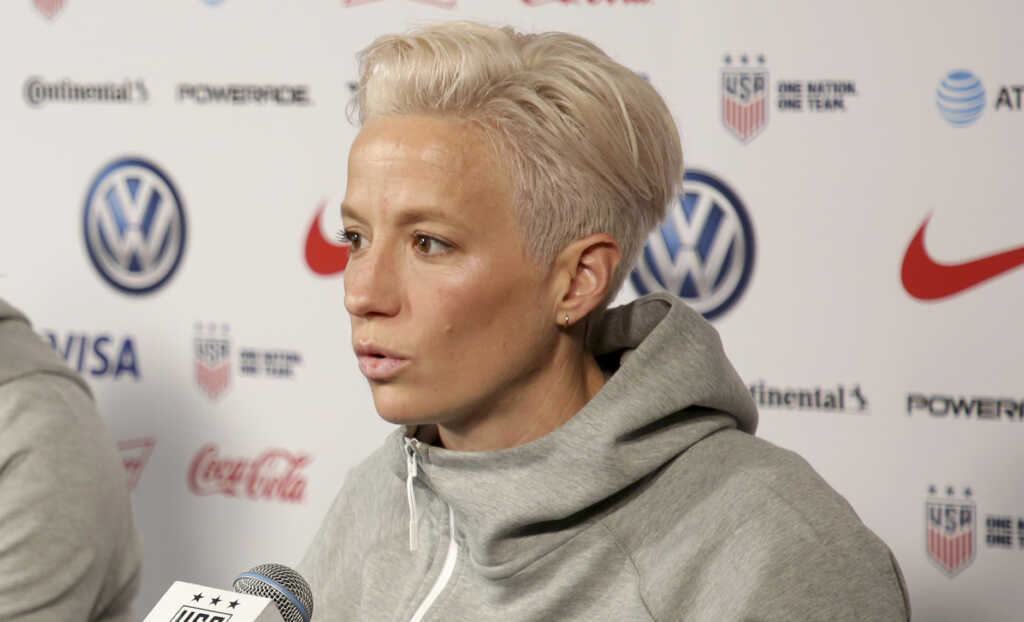Olympic soccer player Megan Rapinoe is making headlines for telling female athletes and their parents to get over the fact that transgender competitors — males identifying as females — might have physical advantages over them.
During an interview with Time, the 36-year-old Rapinoe said she is fully supportive of “trans inclusion” in women’s sports and dismissed concerns about athletic fairness, saying people — and parents, in particular — “need to understand that sports is not the most important thing in life.”
Listen to CBN News’ brand new morning podcast, Quick Start 👇
“I would also encourage everyone out there who is afraid someone’s going to have an unfair advantage over their kid to really take a step back and think what are we actually talking about here,” she said. “We’re talking about people’s lives. I’m sorry, your kid’s high school volleyball team just isn’t that important.”
The comments from Rapinoe seem quite hypocritical, as it was her own high school sports experience — as is generally the case — that paved the way for her highly successful Olympic career. In high school, she ran on the track team and played basketball and soccer. It was her skill in the latter that resulted in her receiving a scholarship from the University of Portland. Additionally, she ended up playing on the U.S. Soccer’s under-17 youth team and delayed college enrollment to play on the under-19 team.
Even still, Rapinoe said, “I think people also need to understand that sports is not the most important thing in life, right? Life is the most important thing in life.”
She then seemingly suggested regulations in sports levels the playing field, telling Time, “At the highest level, there is regulation. In collegiate sports, there is regulation. And at the Olympic and professional level. It’s not like it’s a free-for-all where everyone’s just doing whatever.”
It appears, however, that is not the case. In March, Lia Thomas — a male who identifies and competes as a female — was hailed by the University of Pennsylvania as the “first Quaker female” to win an NCAA individual title. Prior to transitioning and competing as a female, Thomas ranked 554th in the 200-meter freestyle. Now, the transgender-identified swimmer is dominating women’s collegiate sports.
New Zealand weightlifter Laurel Hubbard — another male who identifies and competes as a female — also demonstrates a clear advantage over women, despite making claims to the contrary. Since beginning to compete alongside women in 2015, Hubbard, who represented New Zealand in the Tokyo Olympics last year, has dominated women’s sports, setting four national weightlifting records and unseating Tracey Lambrechs, a former Olympic weightlifter, as the top female competitor in the weight class.
There are, of course, other examples.
Nevertheless, Rapinoe told Time such advantages are “not happening.”
“So we need to start from inclusion, period,” she said. “And as things arise, I have confidence that we can figure it out. But we can’t start at the opposite. That is cruel. And frankly, it’s just disgusting.”
“We need to really kind of take a step back and get a grip on what we’re really talking about here, because people’s lives are at risk,” she continued. “Kids’ lives are at risk with the rates of suicide, the rates of depression and negative mental health and drug abuse.”
As CBN’s Faithwire reported, there is some data casting doubt on whether allowing children to undergo transgender therapies, treatments, and surgeries lowers their risk of committing suicide.
***As the number of voices facing big-tech censorship continues to grow, please sign up for Faithwire’s daily newsletter and download the CBN News app, developed by our parent company, to stay up-to-date with the latest news from a distinctly Christian perspective.***



